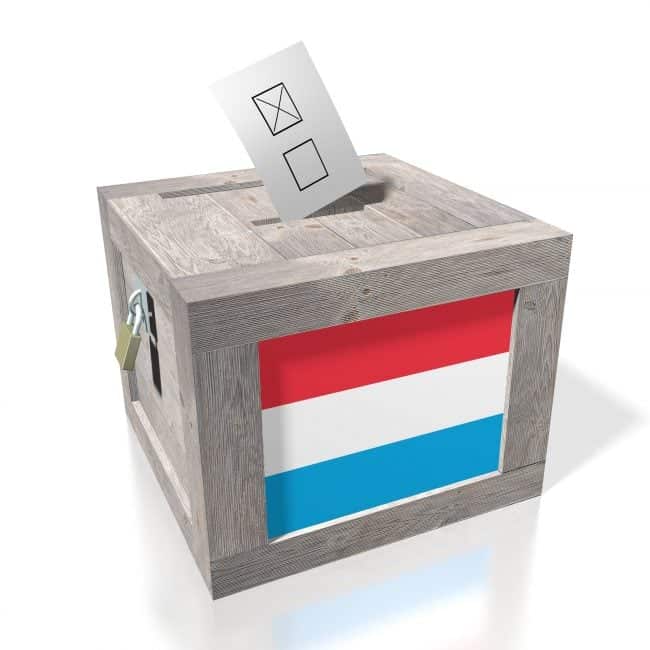In Luxembourg, voting in elections is both a right and an obligation for citizens. Here you will find all the information you need on :
- the principle of voting in Luxembourg
- the various elections in which a citizen may vote or participate as a candidate
- how to register to vote
- how elections are held in Luxembourg: municipal, legislative, European and trade union.
General principles of elections in Luxembourg
Voting in Luxembourg: a right, but also a duty
Luxembourg citizens are entitled to vote from the age of 18. They are automatically registered on the electoral roll.
In Luxembourg, voting in elections is compulsory if you are registered on the electoral roll. Failure to vote can result in a fine of between 100 and 1,000 euros. Only a few cases can be excused. These include voters over 75 years of age, or those unable to vote for professional reasons.
Postal voting may be authorized in exceptional circumstances. However, proxy voting is not permitted.
Electoral roll registration / deletion
Voter registration must be completed no later than the 55th day before the election date.
Registration can be made via myguichet.lu or directly with your local authority, on presentation of a valid identity document.
Registration on the electoral roll is permanent. It does not need to be renewed. If you move to another commune, your electoral roll registration is automatically transferred.
If a voter wishes to be removed from the electoral roll, he or she must submit a written request to the aldermanic college, enclosing a copy of his or her identity card.
Do you have other administrative requirements in Luxembourg? Consult our administrative guide
Single-round secret ballot elections
Elections in Luxembourg are based on a single round of voting, by secret ballot. Voters go into a polling booth to tick the boxes of the candidates chosen on their ballot paper. They then place the folded ballot paper in a ballot box, under the supervision of dedicated officers.
At the end of voting, the ballots in the ballot box are counted. All votes are counted, office by office. If, at the end of the count, no party has obtained an absolute majority to form a government or city council, the various parties meet to negotiate. They then form a coalition government or council . A joint program will be defined for the coming period. Positions will be distributed between the different political parties in the coalition.
Luxembourg municipal elections
Municipal elections are held every 6 years in Luxembourg. The last municipal elections took place on June 11, 2023. For the first time, the entire resident population was invited to take part in these elections, regardless of length of residence.
Municipal elections are held to elect municipal councillors.
Who votes in municipal elections?
To vote in COMMUNAL elections, the voter must :
- be at least 18 years old*,
- be registered on the electoral roll at least 55 days before the election,
- enjoy civil rights and have not been deprived of the right to vote in the State of residence or in the State of origin,
- be Luxembourgish or non-Luxembourgish,
- be domiciled in the Grand Duchy, in the commune where you wish to vote, with no restriction on length of residence in Luxembourg.
For more information, visit "jepeuxvoter.lu".
Principle of communal elections in Luxembourg
Municipal elections are held every 6 years. They are held to elect the representatives in each commune of Luxembourg: the burgomaster, his aldermen and the communal council.
Non-Luxembourg residents may stand as candidates in local elections in their place of residence. They must have been resident in the said commune for at least 6 months and in Luxembourg for at least 5 years. The last year must be uninterrupted. Candidates must apply at least 60 days before the election.
Municipal elections in Luxembourg
The invitation to the polling station is sent to voters at least 8 days before the election. Voters must present themselves on polling day at the polling station indicated, with their identification.
Elections are held on the basis of relative majority for municipalities with fewer than 3,000 inhabitants, and proportional representation for municipalities with more than 3,000 inhabitants.
Each elector has a number of votes equivalent to the number of seats to be filled on the municipal council. Voters may choose to vote for an entire list, or to divide their votes between the various candidates. They may even choose to give 2 votes to one or other candidate, without exceeding their total number of votes.
To cast their vote, they tick the corresponding boxes on the ballot paper.
Legislative elections in Luxembourg
Legislative elections are held every 5 years in Luxembourg. They are used to elect the 60 deputies who will make up the Chamber of Deputies. Following this vote, a new government is formed to reflect the electorate's vote.
The last general election was held on Sunday, October 8, 2023.
Who can vote in parliamentary elections?
To vote in the legislative elections, the voter must :
- be of Luxembourg nationality,
- be at least eighteen years old* on election day,
- enjoy civil and political rights,
- be domiciled in the Grand Duchy of Luxembourg. However, Luxembourg citizens living abroad may vote by post.
All Luxembourg voters registered on the electoral roll are called to vote in the parliamentary elections.
How do I vote in the legislative elections?
For the deputy elections, the country is divided into 4 constituencies: the Centre represented by 21 deputies, the South by 23 deputies, the North by 9 deputies and the East by 7 deputies.
Each voter has a maximum number of votes equivalent to the number of MPs in his or her constituency. There are several ways of distributing these votes:
- vote for an entire list representing a single political party(see the list of the main political parties in Luxembourg). In this case, simply tick the box above the chosen list on the ballot paper.
- distribute your votes by name among several candidates, even if they belong to different political parties. You must then tick the box opposite the name of the chosen candidate. You can give an advantage to one or more candidates by giving them a maximum of 2 votes. In this case, tick the 2 boxes opposite the candidate's name. Be careful not to exceed the total number of votes to which you are entitled: 23 for the southern region, 21 for the central region, 9 for the northern region and 7 for the eastern region.
Invitations to the legislative elections are sent out at least 5 days in advance. Voters must present themselves at the polling station indicated, with their identification.
European elections in Luxembourg
The European elections enable European citizens to vote for their representatives in the European Parliament for the next 5 years.
To date, the DP has 2 seats, the CSV 2 seats, dei Greng 1 seat and the LSAP 1 seat. Find out more about the European Union in Luxembourg.
The next European elections will take place on June 9, 2024.
Registration on European electoral lists
As voting is compulsory in Luxembourg, Luxembourgers are automatically registered on the electoral roll.
Residents of other European countries and of non-luxembourgish nationality must register on local electoral lists in order to vote for Luxembourg deputies.
Voters can register with their commune of residence, or via MyGuichet.lu.
Voters can also register with their national consulate to vote for MPs from their country of origin. Please note that you cannot vote for both MEPs and MPs from your home country. Voters will have to choose for which representatives they wish to vote: Luxembourg or their country of origin.
Conditions for voting in European elections
To vote in the European elections, the voter must :
- be at least 18 years old*,
- be of Luxembourg nationality or a citizen of another EU member state,
- be domiciled in Luxembourg,
- be registered on the electoral roll at least 86 days before the election, i.e. before April 13 for the 2024 elections
- for Luxembourg nationals, be domiciled in the Grand Duchy
- for nationals of another EU member state, be domiciled in the Grand Duchy and have resided there at the time of application for registration on the electoral roll provided for by law.
* Persons who will have reached the age of 18 on election day, but have not yet done so at the time of application, must present an authorization from their parents or guardian.
Luxembourgers domiciled abroad are eligible to vote in European elections by postal ballot.
Postal voting in Luxembourg
In Luxembourg, it is compulsory for all registered voters to vote in the various elections. It is not possible to be represented, but it is possible to vote by post.
Postal voting is available for :
- over 75 years of age,
- who are unable to travel for health reasons,
- who are unable to attend the polling station in person for duly justified professional or personal reasons,
- who live in a commune other than the one in which they are called to vote.
Applications to vote by post must be sent to the College of the Mayor and Aldermen of your municipality, no earlier than 10 weeks and no later than 30 days before election day.
To find out more about elections and voting rights in Luxembourg, visit the following websites: www.guichet.public.lu and www.elections.public.lu
Please note: don't forget to register with the Consulate of your country of origin in Luxembourg so that you can continue to take part in some of your home country's elections.
Silver partner








